
- Автоматизация
- Антропология
- Археология
- Архитектура
- Биология
- Ботаника
- Бухгалтерия
- Военная наука
- Генетика
- География
- Геология
- Демография
- Деревообработка
- Журналистика
- Зоология
- Изобретательство
- Информатика
- Искусство
- История
- Кинематография
- Компьютеризация
- Косметика
- Кулинария
- Культура
- Лексикология
- Лингвистика
- Литература
- Логика
- Маркетинг
- Математика
- Материаловедение
- Медицина
- Менеджмент
- Металлургия
- Метрология
- Механика
- Музыка
- Науковедение
- Образование
- Охрана Труда
- Педагогика
- Полиграфия
- Политология
- Право
- Предпринимательство
- Приборостроение
- Программирование
- Производство
- Промышленность
- Психология
- Радиосвязь
- Религия
- Риторика
- Социология
- Спорт
- Стандартизация
- Статистика
- Строительство
- Технологии
- Торговля
- Транспорт
- Фармакология
- Физика
- Физиология
- Философия
- Финансы
- Химия
- Хозяйство
- Черчение
- Экология
- Экономика
- Электроника
- Электротехника
- Энергетика
1 IDIDENTITITY
E
L
1 IDENTITY
U
D
O
M
Objectives: Listen, read and talk about your identity and other people’s; discuss urban tribes;
write a short description; learn more about present tenses.
 TOPIC TALK
TOPIC TALK
a
1 Make guesses about which of the people in the photos (a–c):
• are proud of their nationality
• belong to an urban tribe (e. g. goths/skaters/punks)
• are into sport
• care about the environment
2 1. 2 1. 3 Listen to the people (1–3) and check your guesses from Exercise 1.
3 1. 4 1. 5 Listen again to the fi rst person. Complete the information in the network.
Identity
My family roots are in 1England/Wales.
I am proud of my/our 2 .
One thing I love about my country is the
3 .
I suppose I’m a/an 4 type of person but I’m a bit too 5 .
I’m 6passionate about/keen on 7art/f ashion/ nature/sport, etc.
I'm (not) into 8 .
country, fl ag, language, national anthem, national landmarks (e. g. famous buildings/places), national sports teams, traditional costume/music/houses
climate, food, landscape, lifestyle, people, wildlife
adventurous, creative, easy-going, energetic, hard-working, idealistic, outdoor, outgoing, practical, romantic, sporty
independent, laid-back, rebellious, shy, untidy
c

wearing badges, band T-shirts, clothes with designer labels, t eam shirts, T-shirts with logos
piercings, tattoos
4 1. 6 Pronunciation Listen and write down the contractions. Then listen again and repeat them.
1 – I’m
b
5 Work in groups. Use the network to talk about your identity.
| |
|
O
S
S
E
L
AVATARS c
b
a
Simon Boswell investigates the weird and wonderful world of online avatars.
1. 7
 Warm Up
Warm Up
1 Work in pairs. Which of the avatars in the pictures (a–d) do you like most? Why? Describe an avatar you have used in a chat, blog or computer game.
Reading
2 P SKILLS BUILDER 12 Use the strategies in the Skills Builder to choose a title (a–c) for the article.
a More Avatars than People
b Creating Identity Online
c The Dangers of Avatars
3 P SKILLS BUILDER 13 Use the strategies to match the paragraphs (1–6) with
the headings (a–g). There is one extra heading.
a How avatars have developed
b The future of avatars
c Avatars in virtual worlds
d Your avatar and you
e Buying virtual jewellery
f Improving your looks
g Identity online
4 Read the text again. Are the sentences true (T) or false (F) or is no information given (? )?
1 When you are online, you can take on any identity. T
2 Avatars first appeared on internet chats.
3 Some people spend a lot of money on their avatars.
4 People use avatars to express their own identity.
5 A person’s avatar is usually not as good-looking as he/she is in real life.
6 Virtual worlds will be more expensive in the future.
1 When you are online you can be anyone or anything – you can create your own image and a new personality, you can be anyone you want to be.
2 The fi rst, simple two-dimensional avatars appeared in the mid 1980s in role-playing computer games. By the late 1990s, they were in web chats like Instant Messenger. Nowadays, avatars are everywhere. In most chats, people use simple, ready-made images or upload their own images but you can also use
dynamic avatars that move around and talk when you type in your message.
3 Avatars in online worlds like Second Life can talk, walk and fl y around, meet people, go shopping or go to classes. There is lots of room for creativity and you can get a brand-new identity. If you’re well-off, you can spend a fortune on buying virtual clothes and
jewellery for your well-dressed, fashion-conscious avatar.
4 Of course, the avatar you choose says a lot about your personality. If your blog avatar is a picture of a kitten, your message is ‘I’m a playful, laid-back person. ’ Well- known cartoon characters or laughing chimpanzees say ‘I’m a really funny person. ’
5 Surprisingly, most people create avatars that look more or less like them and behave like them. However, nearly all avatars are tall, young and nice-looking so people obviously make a few improvements to their bodies and they also experiment with things like long hair, tattoos and piercings. Many people have more than one avatar, a sensible one for work, a good- looking, easy-going one for meeting people and a silly one for having fun.
6 Soon, over eighty percent of internet users will have at least one avatar and in some countries there will be more avatars than real people. Some people say that we spend too much time in virtual worlds and will become afraid of meeting people in the real world.
Others look forward to the time when their avatar will look and act just like a real person and be able to travel around bigger, more exciting virtual worlds.
1 IDIDENTITITY
5 Vocabulary Look at the Word Builder. Match the adjectives with the meanings below.
rich attractive (x 2) stylish relaxed (x 2) totally new can be used immediately
a flat image into wearing all the latest styles famous
Word Builder Compound adjectives
brand-new, easy-going, fashion-conscious, good-looking, laid-back, nice-looking,
ready-made, two-dimensional, well-dressed, well-known, well-o
8 Look at the Sentence Builder. Match other examples of
like (1–8) in Exercise 7 with the uses (a–e) below.
Sentence Builder like
a I like chatting online.
(verb: to talk about preferences)
b My handwriting is like my dad’s. / My handwriting looks like my dad’s.
(preposition: similar to )
c What is your friend like?
(preposition: ask for a general description)
d What does my avatar look like?
(preposition: ask for a description of appearance)
e There are various virtual w or lds, like Second Life . (preposition: for example)
LANGUAGE CHOICE 2: VOCABULARY PRACTICE
SKILLS BUILDER 24
6 Work in pairs. Ask and answer the questions.
1 What well-known stars (film/music/sport) do you think are good-looking?
2 How fashion-conscious are you? Give examples.
3 What do you wear when you want to be well-dressed?
4 How easy-going are you? Give examples.
5 If you suddenly became very well-off, what brand-new thing would you buy?
Writing
7 Read the description and look at the picture. Find four diff erences.
What does my avatar look
1like? Well, she looks a bit 2like me but she’s a bit
taller and slimmer and she’s got long brown hair and blue eyes. What is she 3like? When she’s in her virtual world, she usually behaves 4like me.
She’s an alternative and rebellious kind of person, just 5like me.
She 6likes really cool
black clothes and silver jewellery and she 7likes going to concerts and hanging out in cool places
in the virtual world, 8like the coffee shops on Bora Island.
LANGUAGE CHOICE 3
9 Work in pairs. Ask and answer the questions.
1 Who are you like in your family? Who do you look like?
2 What clothes do you like? Give examples with like.
3 What do you like doing online? What kind of computer games do you like? Give examples.
4 What websites do you visit most often? Give examples with like .
10 Create your own avatar. Write notes about the things below:
• what it looks like
• how it behaves
• where you use it
• why you chose your avatar
11 Use your notes to write a description of your avatar like the one in Exercise 7.
12 Work in groups. Ask and answer questions about your avatars. Use the cues in Exercise 10.
A: What does your avatar look like?
B: He’s tall with long red hair. He looks a bit like me.
No Comment
‘I never forget a face but in your case I’ll make an exception. ’
Groucho Marx, American comedian

|
O
S
S
E
L
GRAMMAR
LANGUAGES
Warm Up
1 Look at the map of world languages. Which continents have the lowest number of endangered languages?
2 Read the text and answer the questions.
1 Why do languages disappear?
2 What do scientists do to save languages?
3 Why do we want to save them?
Key
= endangered language
1. 8
 Your Culture Where in the world is your language spoken? What languages have infl uenced your language? What foreign words are used in your language now?
Your Culture Where in the world is your language spoken? What languages have infl uenced your language? What foreign words are used in your language now?
Present tenses
 Name the tenses (Present Simple or Present Continuous) in the sentences (1–5) underlined in the text and match them with the things they talk about (a–e).
Name the tenses (Present Simple or Present Continuous) in the sentences (1–5) underlined in the text and match them with the things they talk about (a–e).
a feelings and opinions
b facts and permanent situations
c routines, things that happen regularly 1
d things happening exactly at the time of spe a king
e things happening around now, not nece s s arily a t the time of speaking
5 Read the rule. Can you change the verb forms in
bold in the sentences (1–2) into the continuous?
• We use the Present Sim p le (no t Present Continuous) with state verbs like these: be, believe, belong, know, like, prefer, remember,
want, understa n d .
1 Older speakers of the language die.
2 We believe we can help save some endangered languages.
 Match the Present Perfect sentences (1–2) with the uses (a–b).
Match the Present Perfect sentences (1–2) with the uses (a–b).
1 Australian and South American natives have
always used plants to treat people.
2 A lot of languages of smaller cultures have disappeared.
1Every two weeks, a language dies. Languages are
becoming extinct faster than endangered animals. Because language is part of national identity, minority languages have often been discriminated against.
In the 19th century, Native Australians and American Indians were not allowed to use their native languages in public in Australia and the United States. It was also illegal to speak Celtic languages in Ireland, Scotland and Wales in the street. Some languages die naturally. While the languages of powerful groups have always spread, the languages of smaller cultures have disappeared. Small communities stop speaking their traditional language and choose the more ‘popular’ one. Slowly, older speakers die and the original language is forgotten.
Practice
7 Which of the people (a–c) could not say these sentences? Why?
1 ‘I’m living in the Amazon jungle. ’
a a native Amazon Indian
b a student on holiday in the jungle
c an engineer building a road in the jungle
2 ‘I teach English. ’
a an experienced teacher of English
b a full-time English teacher
c a PE teacher teaching an English class
3  ‘I've done my homework. ’
‘I've done my homework. ’
a a student giving her homework to the teacher
b a student after she finished her homework
c a student planning to do her homework
LANGUAGE CHOICE 4


1 IDENTITY
Grammar Alive
Personal information
9 1. 9 Listen to the dialogue. Answer the questions about Martha and James.
1 What languages do they speak well?
2 What languages are they learning?
3 What countries have they been to?
2 ftany endangered languages have no written
form but they carry amazing knowledge of local environments. Native Australians and South Americans have always used plants to treat people. Unfortunately, many of their languages are dying and this knowledge may one day be lost forever.
 Christine Davies, from the Enduring Voices project, told us: ‘3 We believe we can help save some endangered languages. 4 We are recording the speakers of endangered languages on all continents. For example, in Australia we have recorded the only living speaker of Amurdag, so this language won’t disappear completely. But while 5 we’re talking now, the last speakers of some native languages all over the world are dying, taking their culture and knowledge with them. So we have to hurry. ’
Christine Davies, from the Enduring Voices project, told us: ‘3 We believe we can help save some endangered languages. 4 We are recording the speakers of endangered languages on all continents. For example, in Australia we have recorded the only living speaker of Amurdag, so this language won’t disappear completely. But while 5 we’re talking now, the last speakers of some native languages all over the world are dying, taking their culture and knowledge with them. So we have to hurry. ’
8 Use the notes to write sentences the people (1–3) could say. Use the Present Simple, Present Continuous and Present Perfect.
I'm learning my 10 th language now. I work at university.
 B starts 5 appear on TV?
B starts 5 appear on TV?
6 feel really stressed?
7 fall in love? 8 use a laptop
A answers 5 appear on TV
regularly – act in
a soap opera this week
6 feel stressed often – feel stressed about the next class
7 fall in love all the time – fall in love with you right now
8 often use a laptop
- chat online on it right now
I've studied languages since I was at school.
1 an expert on languages
• learn my 10th language now • work at university
• study languages since I was at school
2 a 6-year-old native Australian child
• speak our language at home
• learn to write in English at school
• never speak to a foreigner
3 an explorer
• be a traveller since I was twenty
• spend very little time at home
• prepare for a trek in the Andes
LANGUAGE CHOICE 5
11 Use the cues to write a questionnaire. Use
correct tenses.
1 How many languages – speak?
How many languages do you speak?
2 What languages – learn now?
3 What subjects – like learning?
4 How many different countries – visit?
5 How many times – speak to a foreigner?
6 What foreign language – need most often?
12 Work in pairs. Ask and answer the questions. Tell the class about your partner.

| |
O
S
S
E
L
SKILLS
TRIBES
Warm Up
1 Vocabulary Look at the network and the photos (a–b). Try to match the tribes with the descriptions (a–g).
Listening
2 1. 10 1. 11 Listen to an interview about urban tribes in the UK. Check your guesses from Exercise 1.

 Urban tribes
Urban tribes
emos, geeks, goths, metal heads, punks, skaters, trendies
Descriptions
a have dyed black/straight hair – into pessimistic punk music – wear dark clothes emos
b into horror fi lms – have dyed hair – wear silver
jewellery/black make-up - into Evanescence
c have scru y clothes/shaved hair – chains/piercings
d like designer labels/loose shirts (male) – into clubbing/shopping
e wear dull clothes – obsessed with technology and gaming
f have long hair/beards – wear leather jackets/ black T-shirts – into heavy metal
g wear baggy clothes – hang out at skate parks – into indie and punk
LANGUAGE CHOICE 6:
VOCABULARY PRACTICE
b
a
DVD Choice
5 DVD 1 Watch the documentary without sound. Order the things the journalist does (a–e). Then watch it with sound and check your answers.
a He goes to the party in goth clothes and make-up. b Two goths put make-up on him and change his hair. c He feels relaxed with his appearance.
d He travels to Whitby for a goth weekend. 1
e He interviews some goths.
6 DVD 1 Watch again. Match the descriptions (1–5) with the people (a–d).
a journalist (x 2) c goth woman b goth man d goth musician
1 has been a goth for a long time b
2 usually feels different from other people but not in Whitby
3 is worried about dressing up like a goth
4 doesn’t like the journalist’s clothes
5 now feels confident in goth clothes
7 Would you like to go to the Whitby Goth Weekend? Would you dress up like a goth?
1 IDENTITY
Watching and Speaking
8 1. 12 DVD 2 Listen to or watch two interviews. Match the descriptions (1–5) with the people.
• Tim • George • Tom • Harry
1 dislikes goths Tim and Tom
2 likes goth music
3 likes punk music
4 has got tattoos
5 thinks he is independent but isn't
9 1. 12 DVD 2 Look at the Talk Builder. Listen or watch again. Choose the replies to the opinions you hear.
Talk Builder Agreein g and disagreeing (1)
Agree Disagree
1 I think they're a b it s i l y. a So do I. b Me too. c I don’t. 2 I’m not into their clothes. a Neither am I. c I am.
b Me neither.
3 I don’t think we’re a tribe. a Neither do I. c I do.
b Me neither.
4 I just love urban tribes. a So do I. b Me too. c I don’t. 5 I’m into their music. a So am I. b Me too. c I’m not. 6 I don’t like those groups. a Neither do I. c I do.
b Me neither.
P SKILLS BUILDER 40
10 1. 13 Listen to the opinions and replies and notice the intonation. Listen and repeat the replies.
11 Write replies to the statements below with your opinions.
Neither am I.
1 I’m not into heavy metal.
2 I think goth clothes are great.
3 I don’t think urban tribes are bad.
4 I’m really into hip hop and rap.
5 I don’t like beards and long hair.
6 I think piercings and tattoos are horrible.
12 Choose one of the topics (a– e). Write fi ve statements about your topic.
I don’t think that goths are very interesting.
a urban tribes in your country
b clothes and fashion
c different styles of music
d personal appearance
e interests and habits
13 Work in groups. Take turns to say your statements to each person in your group. Record their responses.
A: I like band T-shirts. B: So do I.
C: I don’t.
14 Report your results to the class.
Sixty percent of the class don’t like piercings. Forty percent like them.


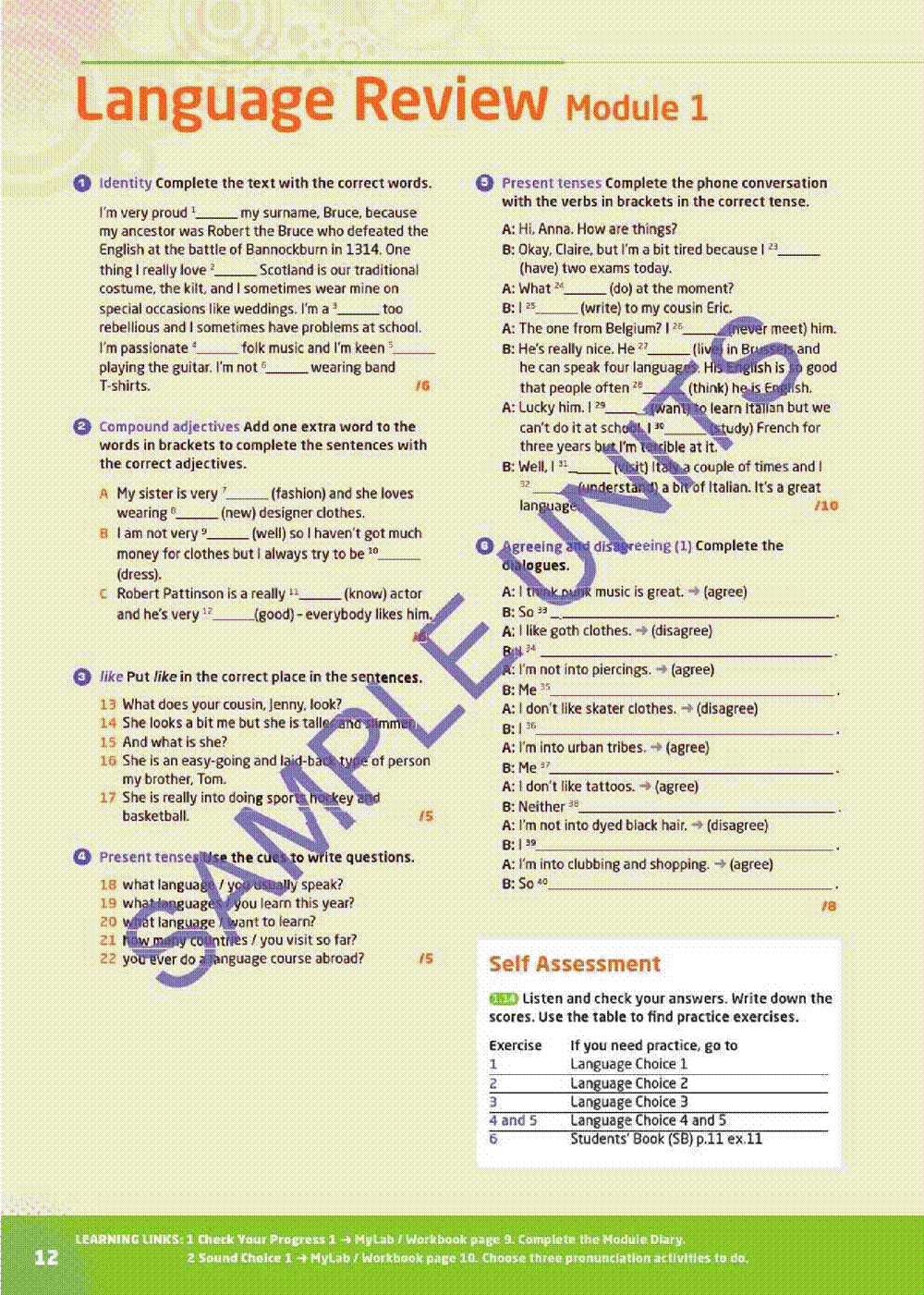
|
L
U
D
O
M
Objectives: Talk about and listen to descriptions of heroes and heroines; read a story and a fi lm review; write a review; learn about modals for speculation in the past.
e Gandhi
b Aung San Suu Kyi
a Elizabeth I
TOPIC TALK
c José de San Martí n
d Joan of Arc
1 Work in pairs. Look at the photos (a–e) and the network. Which of the people have you heard about? What did they do? When did they live? (e. g. in the 20 th century )
2 3. 2 3. 3 Listen and identify three of the heroes in the photos (a–e). Why were they heroes?
3 3. 4 3. 5 Listen again to the fi rst person. Complete the information in the network.
4 3. 6 Pronunciation Listen and write down the dates. Then listen again and repeat them. What dates are important in your country’s history?
5 Your Culture Choose a hero/heroine from your country. Find out information about him/her. Then work in groups. Use the network to talk about your person.
Biography
wa s a great man/woman. He/She came from 1England/India /South Africa.
He/She was born into a/an 2 . He/She had a 3diffi cult/happy/privileged childhood.
As a young man/woman he/she 4 . After that, he/she 5 of Indians in South Africa .
Later, he/she 6 India .
In my opinion, he/she was a great 7 _ .
aristocratic, middle-class, poor, privileged, royal, wealthy, well-known, working class family
joined the army, civil service
studied law, medicine, science
took part in/organised (peaceful) demonstrations, protests, a rebellion
worked as a doctor, lawyer, scientist, teacher
campaigned/fought for equal rights, freedom of speech, human rights, peace, the independence of.............................................................................................. , women’s rights
campaigned/fought against child labour, colonialism, discrimination, poverty, racism, slavery, the invaders
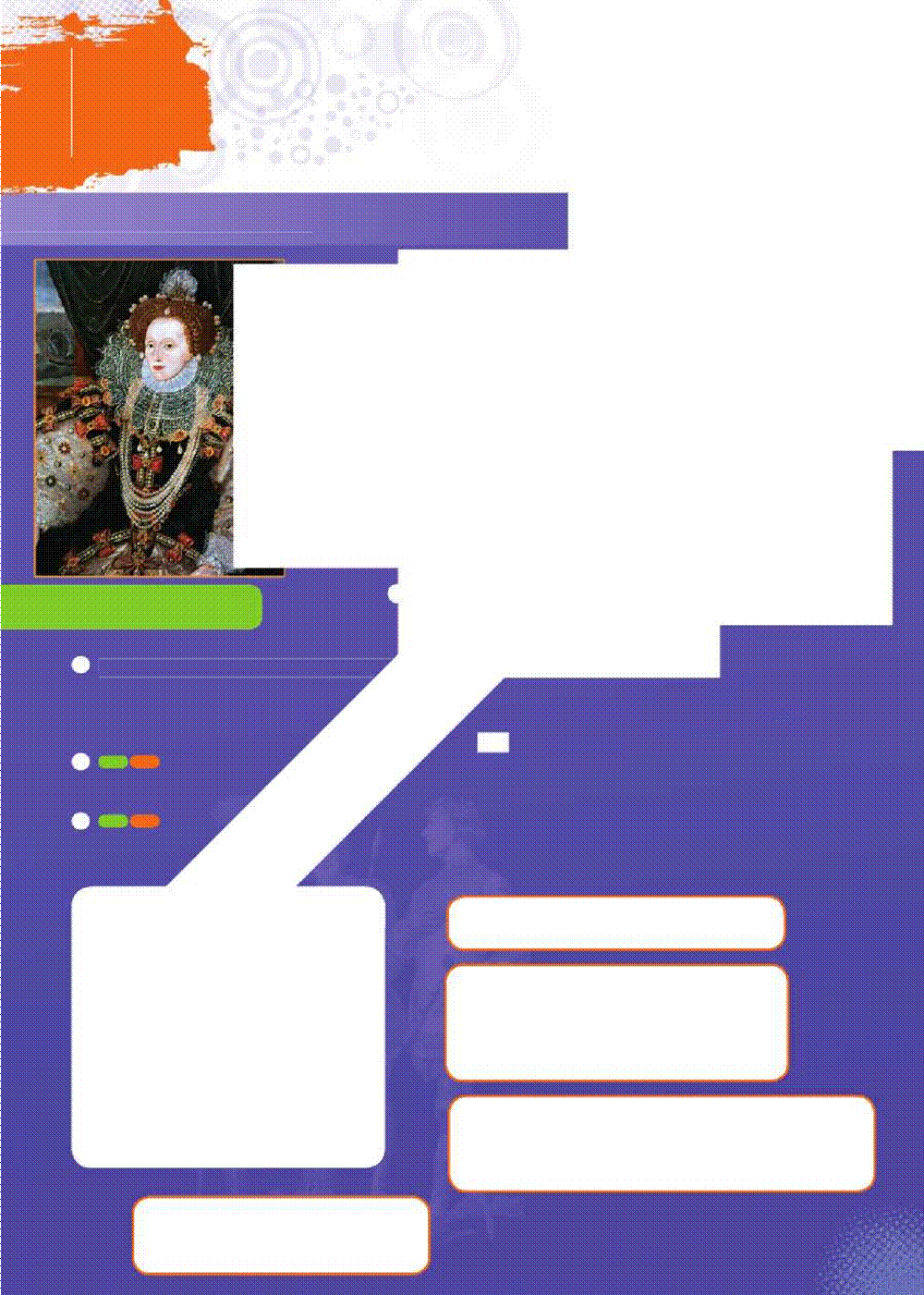
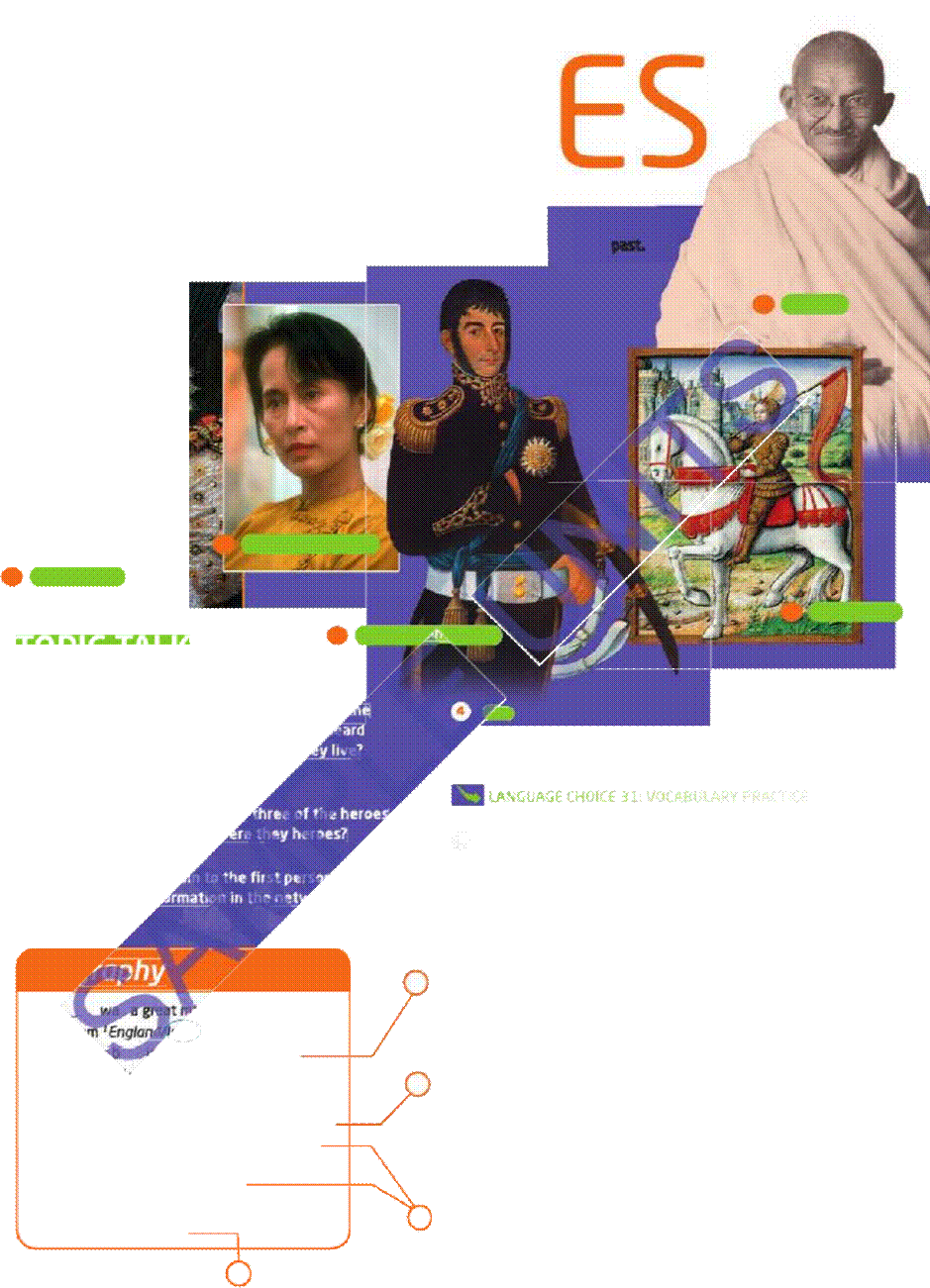
artist, explorer, leader, liberator, pioneer, revolutionary, ruler, scientist, social reformer,
soldier, thinker, writer 45
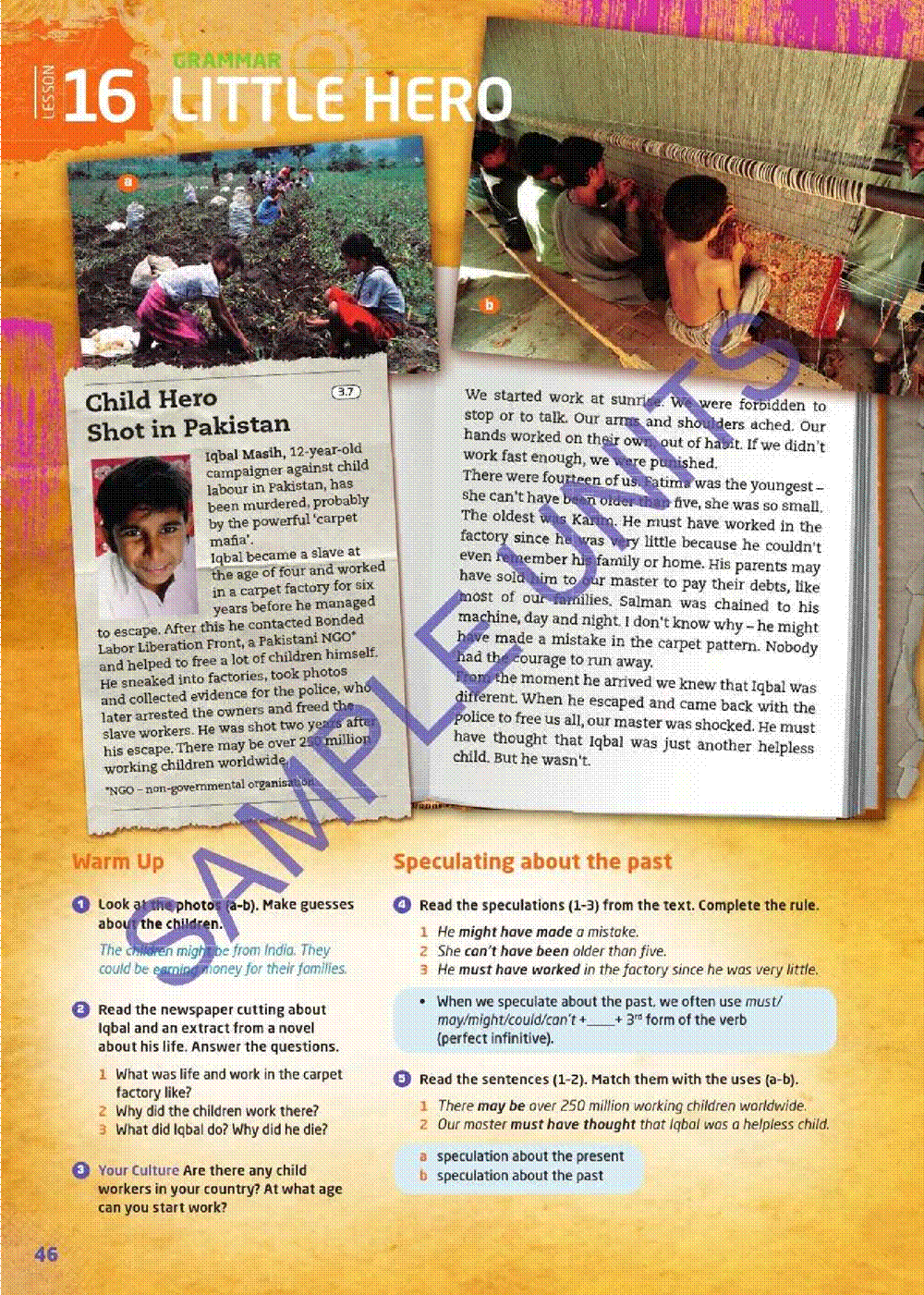
6 HEROES
Practice
6 Match the sentences (1–3) with the best paraphrases (a–b).
1 He can't have made a mistake.
a Maybe he didn't make a mistake.
b I'm certain that he didn't make a mistake.
2 He must have worked in a carpet factory.
a I’m sure he works in a carpet factory. b I'm sure he worked in a carpet factory.
3 The children may have escaped from slavery.
a Perhaps the children escaped from slavery.
Grammar Alive Making guesses
9 3. 8 Listen to the dialogue. What reasons do Lisa and Rob give for James becoming a volunteer?
10 Work in pairs. Use the cues and modals to make dialogues.
A: Anna is crying.
B: She may have broken up with Jake.
A: She can’t have broken up with him. She loves him!
A starts B answers
b The children certainly escaped from slavery.
LANGUAGE CHOICE 32
7 Use the cues to complete the sentences.
1 Iqbal sneaked into carpet factories many times. He must have been clever (must / be clever).
2 A factory manager has been arrested. He
(may / employ children in his factory).
3 A girl is selling snacks in the street. She
(can't / be born into a rich family).
1 Anna is crying. (She loves
Jake. )
2 Mike hasn't come to scho o l today. (He’s very healthy. )
3 Kate looks unhappy. (Sh e ’s the best student. )
4 Dave is late. (He’s always on time. )
5 Maria is n ’t answering the phone. (She’ s waiting for
Jack’s call. )
1 may / break up with
Jake
2 may / catch a cold
3 must / fail a test
4 could / miss the bus
5 must / switch it off
4 The child disappeared from the street. The B starts A answers
carpet mafia (may / kidnap her).
5 The children look hungry. They (might / not eat anything all day).
6 This carpet is beautiful. It (must / take a lot of time to make it).
LANGUAGE CHOICE 33
8 Use the cues and must/may/might/could/can't and have + the 3rd form of the verb to make sentences about Iqbal.
have a lot of courage be weak
have a rich family be intelligent
6 Vicki is out.
(It’s only 8 a. m. )
7 Nick is driving! (He’s a terrible driver. )
8 Fiona has a great sun tan. (I saw her at school last week. )
9 Adam has no time for his friends. (He is too lazy. )
10 Colin didn’t come to the party. (He has very good
memory. )
6 may / go to the
cinema
7 must / pass his driving test
8 could / be on holiday
9 must / find a part-time job 10 may / forget
hate his situation dream about freedom plan his escape for a long time go to school
11 Look at the photos (c–d) and make guesses about
the people.
He may have run away from home. He must be
frightened.
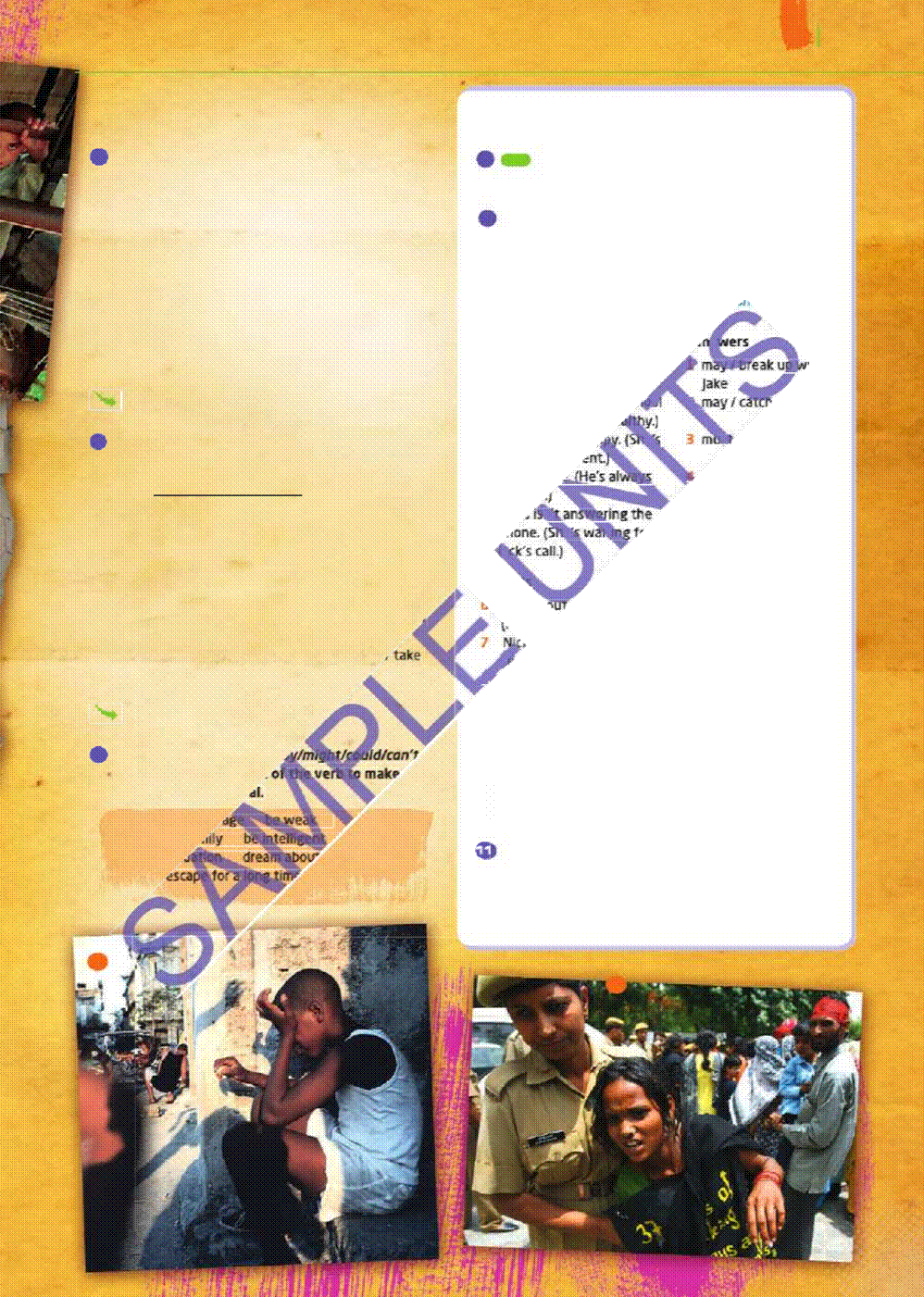
c
d
|
a
SKILLS
O
S
S
E
L
ACTION HEROES
Warm Up
1 Look at the photos (a–b). Who are your favourite action heroes and what are your favourite action fi lms?
Listening
2 3. 9 3. 10 P SKILLS BUILDER 6 Use the strategies in the Skills Builder to listen to a conversation about a fi lm and choose the best answer for the questions.
1 What has Alice been doing?
a studying b doing exercise c shopping
2 How does Simon feel?
a bored b relaxed c tired
3 How does Alice feel?
a bored b worried c impatient
4 What does Simon become?
a bored b irritated c tired
5 Where are Alice and Simon?
Reading
5 Read the extracts from Robert Ludlum’s novel, The Bourne Identity . Order the sentences (a–f).
a The doctor found information about a bank account in Switzerland.
b Bourne found out that he had a lot of money and that his first name was Jason.
c A badly injured man was picked up from the sea. 1
d Bourne remembered how to get to the bank where he had the account.
e His life was saved by a doctor but he had lost his memory.
f He went to a hotel in Zurich that he remembered from before and found out his surname.
a at school b at home c on holiday
‘Who’s there? Who’s in this room? ’
3. 12
6 Who are Alice and Simon?
a friends b classmates c brother and sister
3 3. 11 Look at the Sentence Builder. Try to complete the sentences. Then listen and check your guesses. How would you say them in
your language?
Sentence Builder
Prepositions at the end of sentences
Questions
Who’s he workin g for?
What are you talkin g 1 ? Who is he talking 2 ?
Why don’t you ring s o meone 3 ?
Relative clauses
He’s an actor I’ve never been keen on. That’s what he’s famous 4 .
She’s watching that quiz show she’s good
5 .
Washburn went quietly to the bed. He did not want to make
a sudden noise or movement that could cause his patient new psychological damage. The next few minutes would be as important as the surgery he had performed on the man many times during the past month.
‘A friend, ’ he said softly. ‘You speak English. I thought you would. How do you feel? ’
‘I’m not sure. ’
‘You were brought here, to the French island of Ile de Port Noir, by fi shermen who found you in the Mediterranean. You’d been shot, many times. I’m a doctor – your doctor. My name is Geoff rey Washburn. What’s yours? ’
The stranger was silent for a minute. Then he turned and looked into the doctor’s eyes. ‘I don’t know, ’ he said.
b
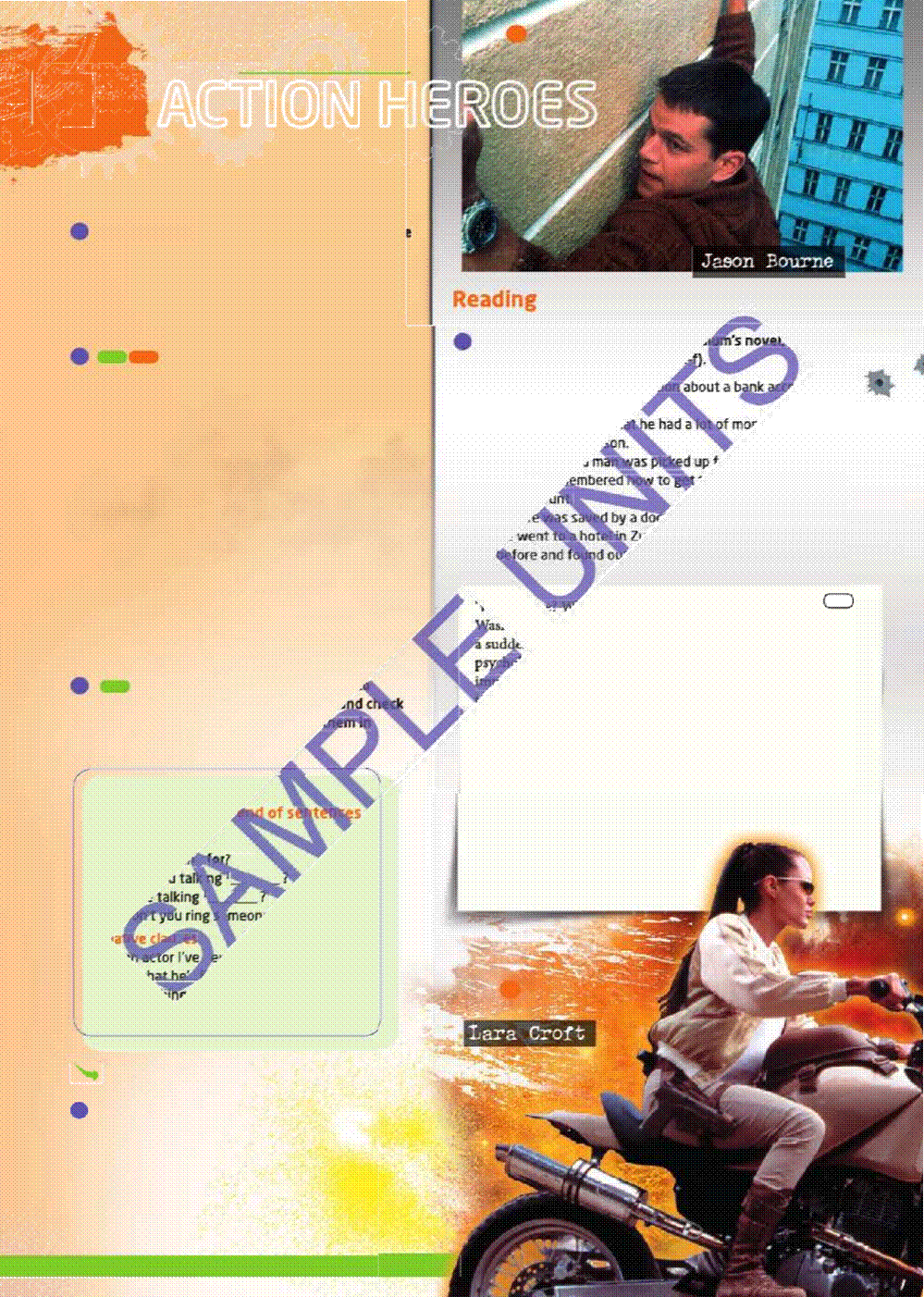
LANGUAGE CHOICE 34
4 Work in pairs. Ask and answer the questions.
1 What new film is everybody talking about?
2 What actors and actresses are you keen on?
3 What films are they famous for?
4 What cinema do you usually go to?
5 Who do you usually ring up and arrange to go to the cinema with?
6 HEROES
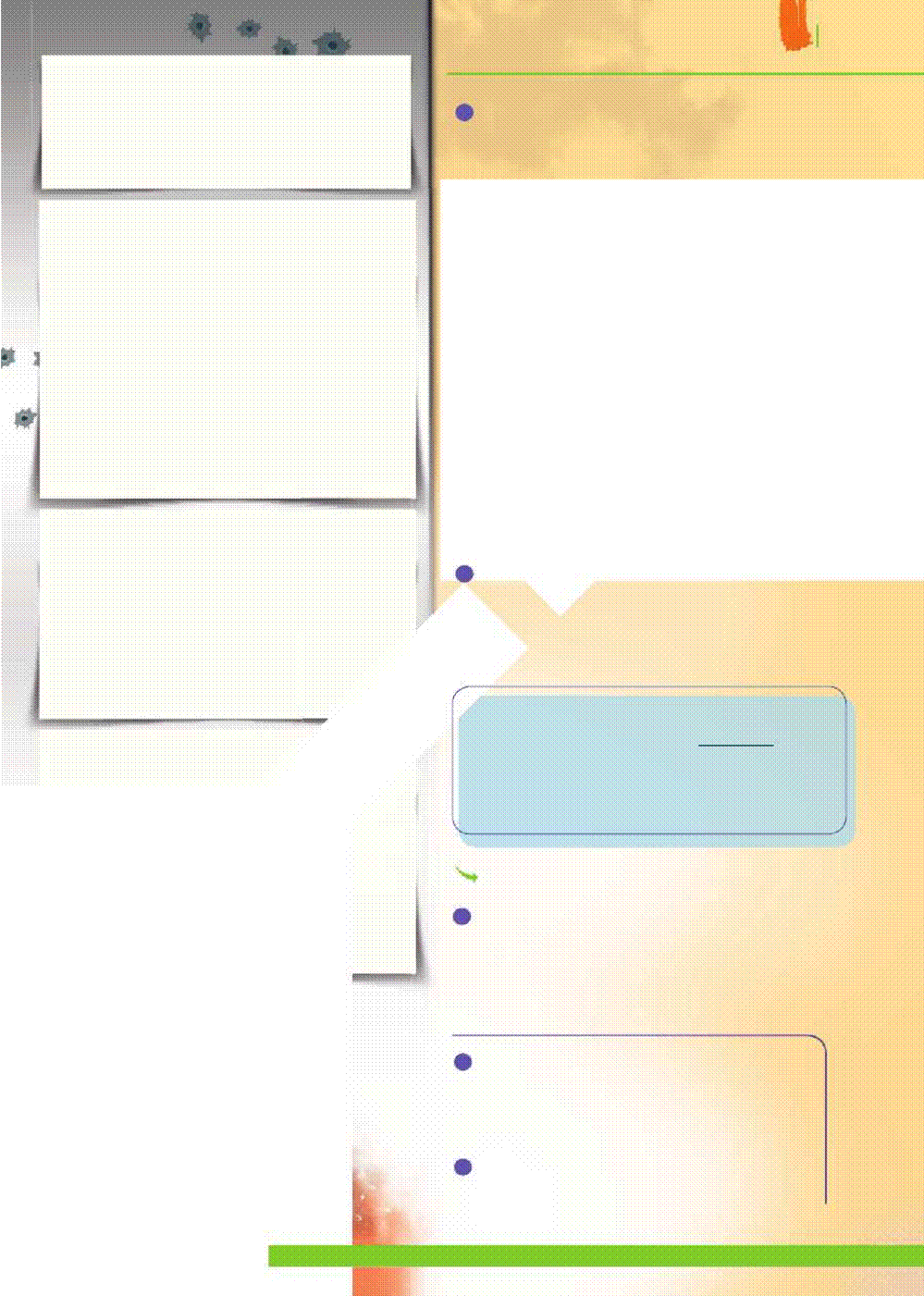
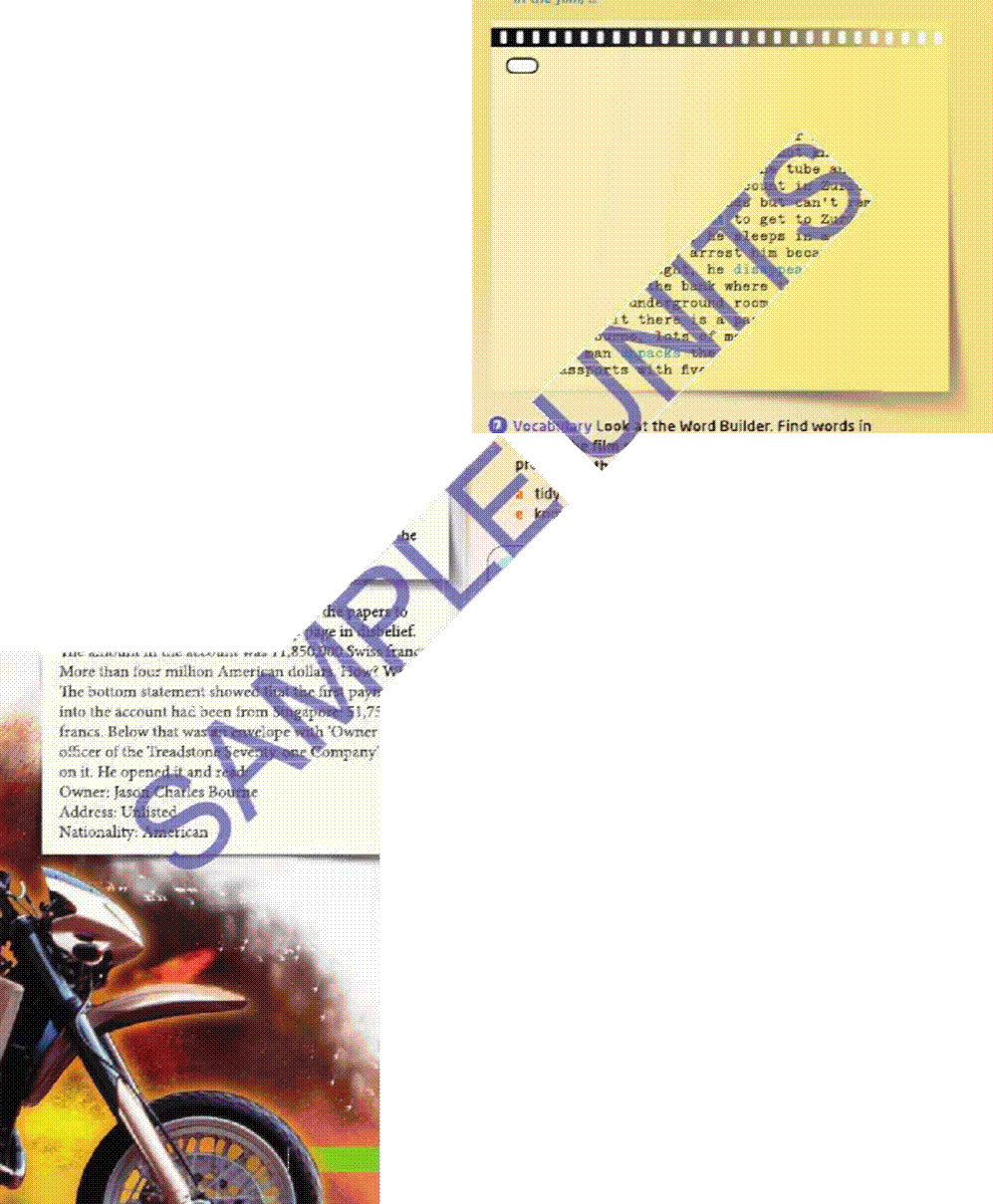 ‘I found this piece of fi lm under your skin. It says: Die Bank Gemeinschaft, 11 Bahnhofstrasse, Zurich, 07- 1712-0-14-260. ’
‘I found this piece of fi lm under your skin. It says: Die Bank Gemeinschaft, 11 Bahnhofstrasse, Zurich, 07- 1712-0-14-260. ’
‘Bank details? ’
‘Exactly. The numbers are in your handwriting – they’re your signature for an account in Zurich. ’
He knew the name of the hotel. Carillon du Lac. He had given it to the taxi driver without thinking. He knew the reception area, and the big glass windows that looked out over Lake Zurich. He had been there before. ‘It’s good to see you again, sir, ’ the receptionist said.
But I don’t know you! I don’t know me! Help me! Please!
‘Thank you, ’ he said. ‘I’ve hurt my hand. Could you fi ll in the form for me and then I’ll try to sign it. ’ The patient held his breath.
‘Of course, sir. ’ The receptionist completed the form, then turned it around for the signature.
Mr J. Bourne, New York, NY, USA.
He stared at it. He had a name – part of a name. J. Bourne. John? James? Joseph? He signed.
He left his room and walked into the street. His feet seemed to take him on a route that he knew – and then there was the Gemeinschaft Bank.
He entered through the heavy glass doors and was directed to a fi rst fl oor receptionist.
‘Your signature, please, ’ the man requested, passing him a form.
He looked and understood; no name was needed this time, just the number of the account. He wrote out the numbers and was shown to a private room.
The banker opened the box and passed the papers to the other man, who stared at the top page in disbelief. The amount in the account was 11, 850, 000 Swiss francs. More than four million American dollars. How? Why? The bottom statement showed that the fi rst payment into the account had been from Singapore: 51, 750 Swiss francs. Below that was an envelope with ‘Owner only, offi cer of the Treadstone Seventy-one Company’ typed on it. He opened it and read:
Owner: Jason Charles Bourne Address: Unlisted Nationality: American
6 Read the fi lm synopsis. Find three diff erences between the book and the fi lm.
In the book, he fi nds a bank statement in the box. In the fi lm, ...
3. 13 A fi shing boat picks up an unidentifi ed man who is badly wounded. The captain is unsympathetic but the ship’s engineer looks
after the man; he removes two bullets from his back and fi nds a plastic tube under his skin.
When the man wakes up, he does not know who he is. The engineer unwraps the tube and fi nds
information about a bank account in Zurich. The man recovers from his wounds but can't remember anything and is impatient to get to Zurich.
When he arrives there, he sleeps in a park and two policemen try to arrest him because it is illegal. After a fi ght, he disappears and in the morning goes to the bank where they take him to an impersonal underground room and give him a box. Inside it there is a passport in the name of Jason Bourne, lots of money in cash and a gun. The man unpacks the things and fi nds fi ve more passports with fi ve different names.
7 Vocabulary Look at the Word Builder. Find words in blue in the fi lm synopsis to complete the box. Then add prefi xes to the words (a–g) to make opposites.
a tidy b like c comfortable d correct
e known f friendly g happy
Word Builder Prefi xes
un + adjective/adverb: unpleasant, 1 unidentified , 2 un + verb: undress, 3 4 il/in/im + adjective: invisible, irregular, impossible,
5 , 6 , 7
dis + verb: disagree, 8
LANGUAGE CHOICE 35: VOCABULARY PRACTICE
8 Work in pairs. Take turns to complete the sentences.
1 I get impatient when people …
2 The things I find unpleasant are …
3 The most uncomfortable place I know is …
4 In my country, it is illegal to …
9 Choose a fi lm that you like. Write notes about the things below:
• general information • summary of story
• favourite scenes
10 Work in groups. Tell your partners about the fi lm. They have to try to guess the fi lm.
LEARNING LINKS: Online Skills 3 ➜ MyLab / Workbook page 113 49
N
O
S
S
E
L
GRAMMAR
| |
Warm Up
 1 Look at the photo. Who are the people?
1 Look at the photo. Who are the people?
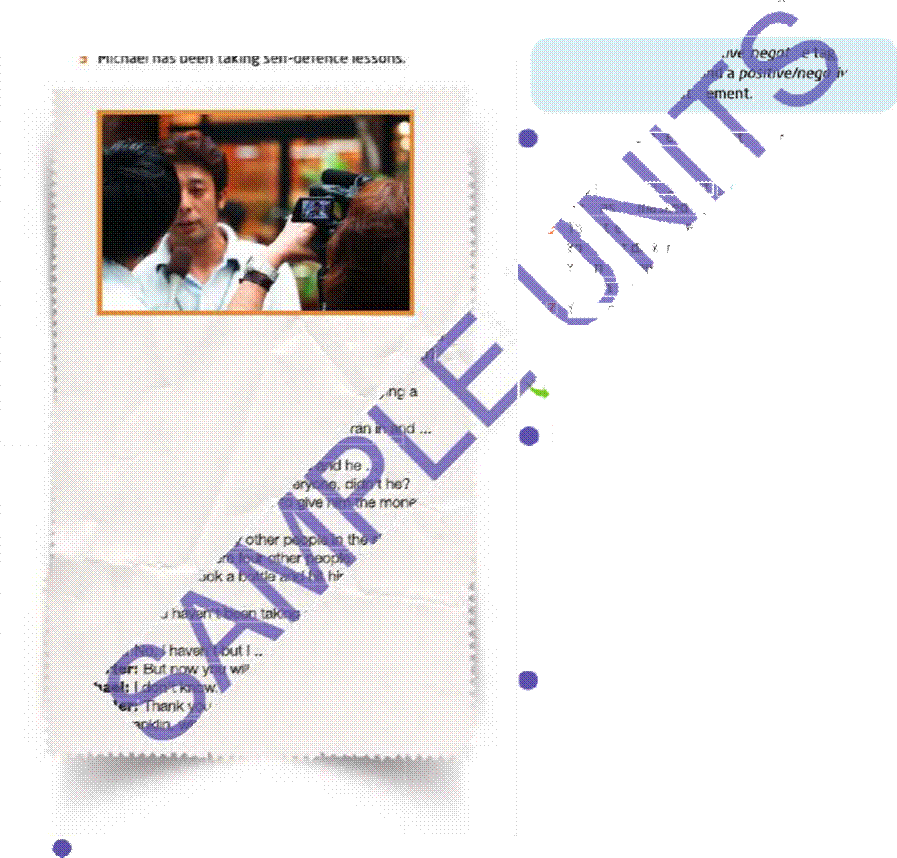 2 3. 14 Read and listen to the interview. Are the sentences true (T) or false (F)?
2 3. 14 Read and listen to the interview. Are the sentences true (T) or false (F)?
1 The robber was armed.
2 Michael hit the robber with a bottle.
3 Michael has been taking self-defence lessons.
4 Read the questions (1–4). Underline the correct words to complete the rule.
1 You live in this street, don't you?
2 He wasn't armed, was he?
3 He threatened to kill everyone, didn't he?
4 You haven't been taking self-defence lessons, have you?
• We normally use a positive/negat i v tag after a positive statement and a positive/negativ e tag after a negative st a tement.
5 Complete the qu estions with c orrect question tags.
1 You live in this street, don’t you ?
2 He w as n’t m as k e d, ?
3 Th e stree ts were empty, ?
4  Y ou c an' t d o k a rate, ?
Y ou c an' t d o k a rate, ?
5 Y ou h a ve t talked to the police, ?

 |
Reporter: With us here is Michael Franklin, who's helped arrest a robber. Michael, you live in this street, don't you? Michael: Yes, I live near the shop.
Reporter: Tell us what happened. You were buying a newspaper at this local shop, weren't you?
Michael: Yes, I was paying when this man ran in and...
Reporter: He wasn't armed, was he? Michael: Well, he had a kitchen knife and he...
Reporter: He threatened to kill everyone, didn't he? Michael: No, he told the owner to give him the money from the till.
Reporter: Were there any other people in the shop? Michael: Yes, there were four other people.
Reporter: So you took a bottle and hit him, didn't you? Michael: I did.
Reporter: You haven't been taking self-defence lessons, have you?
Michael: No, I haven't but I...
Reporter: But now you will, won't you? Michael: I don't know.
Reporter: Thank you, Michael. We've been talking to Michael Franklin, who's saved four lives today. And now...
Question tags
3 Read the reporter’s questions (1–2). Match them with the explanations (a–b).
1 You hit him, didn't you?
2 Were there any other people in the shop?
6 The shop will be closed tomorrow, ?
7 Y ou w ouldn’t do it again, ?
8 Y o u haven't been coming recently, ?
9 The people are grateful to you, ?
LANGUAGE CHOICE 36
6 For each question (1–6), make positive and negative questions with question tags.
1 Are your friends brave?
Your friends are brave, aren’t they? Your friends aren’t brave, are they?
2 Can you put out a fire?
3 Have your friends done first aid training?
4 Was there an accident in your school last year?
5 Did the criminal have a gun?
6 Would you like to learn self-defence?
7 Use the cues and your knowledge of your partner to ask positive or negative tag questions. Add three questions of your own.
1 (not) be very brave
You are very brave, aren't you? You aren't very brave, are you?
2 (not) learning self-defence
3 (not) be in a dangerous situation
4 (not) want to become a hero
5 (not) can give first aid
6 (not) become a police officer
 Work in pairs. Ask and answer your questions. A: You are very brave, aren't you?
Work in pairs. Ask and answer your questions. A: You are very brave, aren't you?
B: No, I am not.
SKILLS
3Writing Workshop 3
1 Look at the book cover. What sort of story do you think it is? Read the book review and check your guess.
3. 15
1 Lorna Doone was
written by R. D. Blackmore in 1869 and is a historical romance set in 17th century England. It was a a best-seller when it came out and since then at least ten fi lms have been made of the book.
2 The story is about the
love between the heroine, Lorna Doone, and a farmer’s son called John Ridd. One day, young John meets Lorna after fi nding his way into the secret valley where she lives. Later, he fi nds out that she is from a
family of robbers and murderers but he likes Lorna and knows it is not her fault she is a Doone. When he is older, John g o e s bac k
to the valley and he and Lorna f a l l in l o ve. However, Carver Doone, the murde re r of John’s father, wants to marry Lo r n, to o and soon the battle betw een the tw o men begins.
3 The plot is full ofboth a c t ion an drama and the main char a cte rs ar e generally interesting. John Ridd is the str o ng, s i lent type who is not only loyal and honest but also brave. His enemy, Ca rver Doone, is also strong and good-looking bu is a violent and evil man.
Lorna is kind and sensitive as well as extremely beautiful though she is sometimes a bit too good to be true. Another criticism that can be made of the book is that the
fi ght between the good and evil is a bit too obvious.
4 To sum up, the book is an exciting story of
love and murder. If you enjoy romance and action, I would defi nitely recommend reading this classic story.
Text Builder
2 Match the paragraphs (1–4) with the topics (a–d). a summary and recommendation
b description of the plot
c introduction and background
d opinions about character and plot
3 Find formal expressions in blue in the text with these meanings (1–4).
1 you should really read it 3 the story’s got lots of
2 it happens in... 4 one more bad thing is …
4 Look at the Sentence Builder. How do you say the linkers in bold in your language?
Sentence Builder Addition linkers
1 The plot is full of both action and drama.
2 John Ridd is not only loyal and honest but also brave.
3 Lorna is kind and sensitive as well as beautiful.
P SKILLS BUILDER 30
5 Use the cues and the linkers in brackets to write sentences about Lorna Doone .
1 The Doones: robbers / murderers (both / and ) The Doones were both robbers and murderers.
2 Lorna: beautiful woman / good person (as well as )
3 John: very strong + brave / honest + loyal (not only /
but also )
4 The book: exciting to read / very romantic (both / and )
6 Write a short book review.
P SKILLS BUILDER 31
1 Choose a story you have read recently. Write notes about it using the topics in Exercise 2.
2 Use your notes to write a review.
3 Check spelling, vocabulary and grammar.
7 Work in groups. Read each other’s reviews. Which of the books would you like to read? Tell the class.
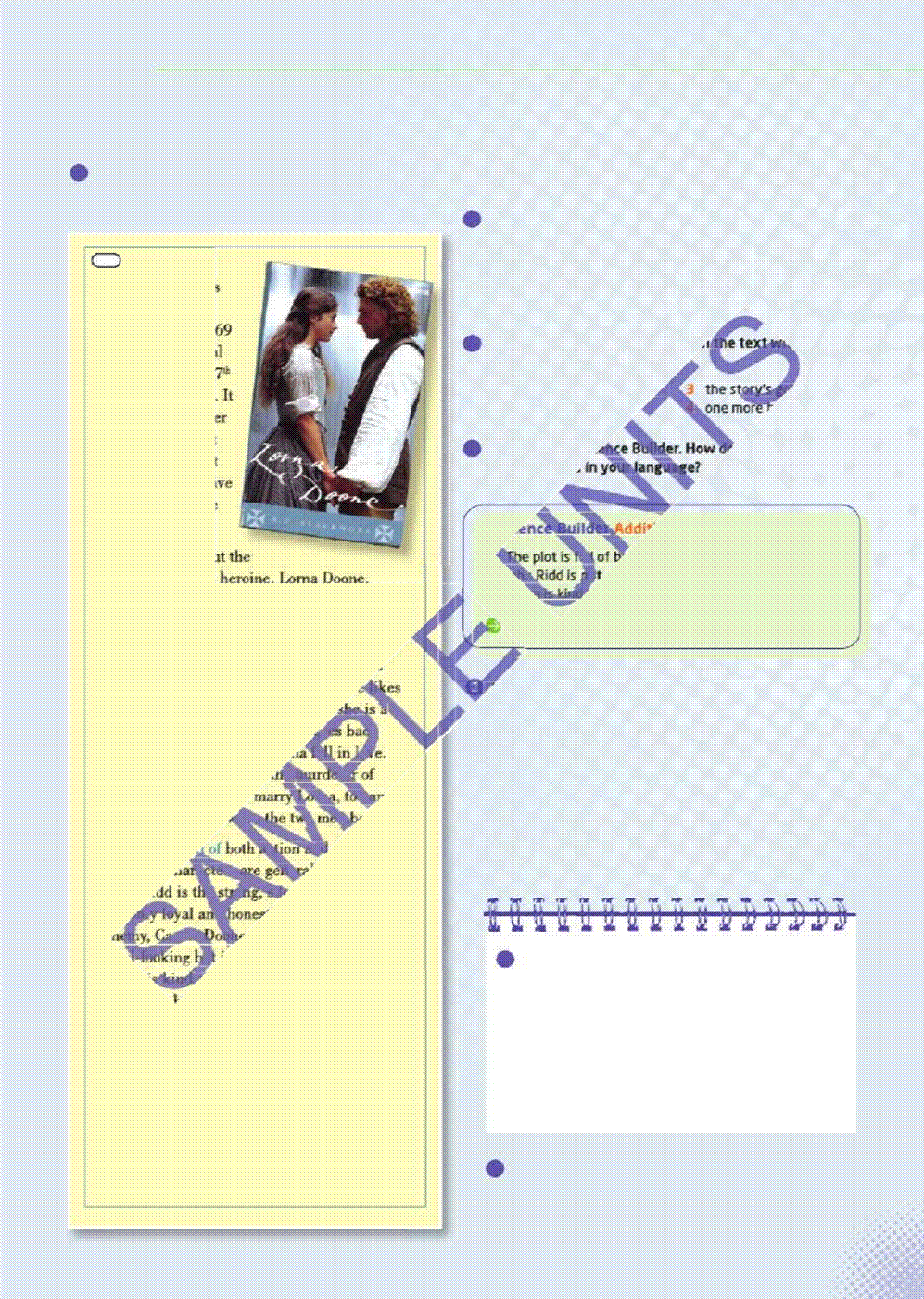
a
SKILLS
3Speaking
Workshop 3
1 Look at photo a. Make guesses about:
• the place • the woman:
– her age – nationality – job
• why she is a heroine
2 3. 16 3. 17 Listen to Karen talking about the photo. Which of her guesses are the same as (or similar to) yours?
3 Look at the Talk Builder. Match the functions (a–d) with the groups of expressions in bold (1–4).
a vague language (you use when you don’t know the word or are not sure about something)
b speculation (about the present or the past)
c additions to the end of the sentence (e. g. to clarify or comment)
d descriptions of position in the photo
Talk Builder Talking about photos
1 She must be in her mid thirties.
She’s probably from a Muslim country. It might be Syria or Turkey.
She looks friendly.
She may have done something for poor people.
2 She’s wearing a kind of scarf.
It might be Syria or somewhere like that. She looks a kind sort of person.
|
|
|
© helpiks.su При использовании или копировании материалов прямая ссылка на сайт обязательна.
|